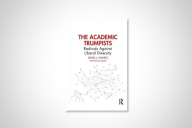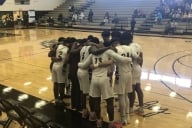You have /5 articles left.
Sign up for a free account or log in.
Thursday was a zero-steps-forward, two-steps-back sort of day for the National Collegiate Athletic Association, at least in terms of legislation. The Division I Board of Directors reversed two decisions it made in a recent spate of hasty rule making, urged by NCAA President Mark Emmert.
Two rules designed to streamline recruiting and trim the NCAA rulebook that were approved by the board in January got sent back to the drawing board, after more than 75 coaches and athletics directors argued that the new rules would wreak havoc on coaches and prospective athletes. The “deregulation” lifted restrictions on how (text messaging was previously prohibited) and how often programs can contact prospective athletes. That reversal follows the suspension or tabling of three other recruiting changes, which eliminated rules defining staff recruiting roles, permitted earlier contact with recruits, and allowed for unlimited printed mailings to recruits.
With Thursday's action, all five of the deregulation rules approved in January that deal strictly with how programs can recruit (some other rules dealt with more tangential issues) have been put on hold.
“We are supportive of moving as aggressively as possible while still studying the issues with due diligence,” Nathan Hatch, president of Wake Forest University and chair of the board, said in a statement. “It’s important to make sure all the pieces of the recruiting model work together to make the most effective change in the culture.”
The rules suspended Thursday will still apply to men's and women's basketball, however, as those programs did not object to them.
The board also scrapped a more stringent academic sliding scale that would have required athletes with lower grade point averages to have higher standardized test scores in order to compete. The board approved the more stringent requirement in fall of 2011, as part of a set of increased academic standards. To adjust to a newly raised 2.3 G.P.A. minimum (up from 2.0), the new sliding scale required a 1080 on the SAT or 93 on the ACT to be eligible for competition. The current scale, which will remain in place, requires students with a 2.3 GPA to score at least a 900 on the SAT or 75 on the ACT.
Board members said other components of the reform package – such as the higher GPA and requirements that athletes spread out their core courses in high school – would already be enough to improve performance. They also said a more stringent scale could disproportionately affect minority and low-income students who might not receive scholarships if they can’t compete in their first year for academic reasons. (Under the plan to phase in the scale, some students who didn’t meet the new standard immediately could qualify for an “academic redshirt year,” where they’d still get a scholarship but sit out of competition while building up course credit.)
Before 2003, the NCAA required minimum standard test scores as well as GPAs, but got ride of the SAT minimum in the face of a lawsuit charging that it discriminated against minority athletes. Despite winning that lawsuit, the NCAA left the scale in place.
“APRs are improving, and I believe they will continue to improve,” Walter Harrison, president of the University of Hartford and chair of the Division I Committee on Academic Performance, said in a statement. “I’m concerned about minority students who would be affected by the dramatic change to the sliding scale. The new 930 APR benchmark required for postseason competition is impacting coaches’ recruiting decisions.”
The board adopted a new rule it says will improve academic performance, though. When calculating a student’s final core-course G.P.A., the NCAA will count only the 16 best grades that meet the required distribution of those courses (math, science, English, etc.). Students are currently allowed to count as many core courses as they can take within the allotted time frame toward their final G.P.A. The change goes into effect Aug. 1, 2016.
And one measure that also received more than 75 override requests will not be revoked. A rule that prohibits live scouting of opponents will go to a full online vote of NCAA membership.
As for the others, the board and working groups will consider new, potentially more desirable approaches and may return with new drafts at a future board meeting.








